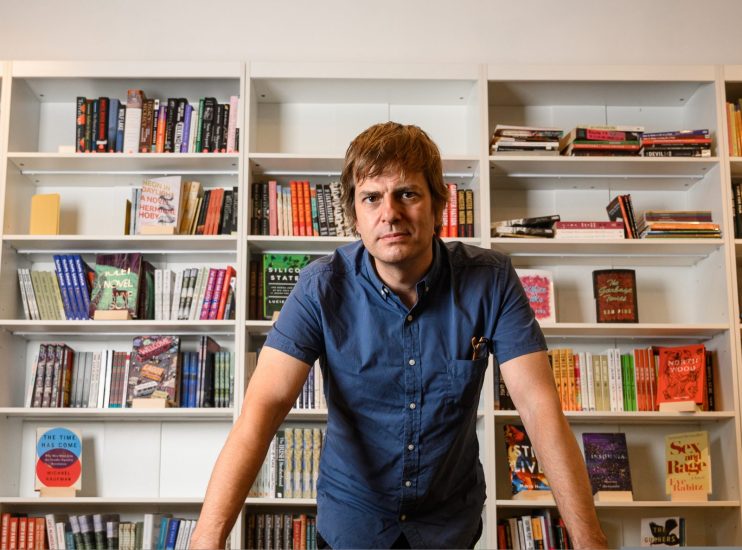Bookshop.org: How a ‘scrappy’ online bookseller is trying to take on Amazon

While the tech revolution has worked its way into all parts of daily life, few industries have experienced as extreme an overhaul as publishing.
US bookstore sales have dropped from highs of more than $17bn (£12.9bn) to less than $10bn, while Amazon’s market share has grown to over 50 per cent.
But now there’s a new kid on the block. Bookshop.org, which provides a platform for independent bookshops to sell their wares to socially-conscious consumers, launched in the UK this month with the express purpose of loosening Amazon’s iron grip on the industry.
Virtual shopfronts
Bookshop allows indie booksellers to create their own free, virtual shopfronts on its platform — similar to a social media profile. They are given the full 30 per cent profit margin on each sale, with roughly 50 per cent going to the publisher and the remainder used to cover fulfilment costs. Bookshop has partnered with wholesaler Gardners, offering same-day delivery for all orders made before midday.
It launched in the US at the beginning of the year and grew from 250 to 900 stores in its first six weeks. The site ballooned from sales of $50,000 in February to a peak in June, when it sold $1m worth of books in a single day. In its first two weeks in the UK, Bookshop has pulled in revenue of around £100,000.
Andy Hunter, who runs the site from a small apartment in Brooklyn, where he lives with his two young children, describes the launch as “the most intense period of my life”.
“We’re not slick or well-funded,” he says. “We’re not backed by venture capital or Silicon Valley. We’ve got it in our corporate bylaws that we’ll never sell to Amazon or any other major US retailer.”
Instead, the venture is “mission-focused”, and has applied for B Corporation status in the UK — a community of companies striving to balance purpose with profit.
For Bookshop, this purpose is serving the needs of independent booksellers and, through them, the wider publishing community. Bookstores, Hunter says, are the “passionate foot soldiers in the battle to keep books a relevant part of our culture”.
Anti-disrupting the industry
For the bulk of sales, which come through the storefronts of the sellers on its platform, Bookshop does not take a cut.
Instead, it earns its keep through an affiliate programme. This grants a 10 per cent commission to registered partners who link to Bookshop’s site. This is matched by an equal contribution to a profit-sharing pool that is split between the indie stores. Bookshop earns a further 10 per cent cut to cover its technology and staff costs.
In the US, Bookshop has secured affiliate partnerships with publishers including Buzzfeed and Esquire. Thousands of social media influencers — from cookbook authors to so-called Bookstagrammers — have also signed up.
The target market is well-heeled consumers who want to support indie booksellers, with the platform positioning itself as a “socially-conscious alternative” to Amazon, rather than a direct competitor. But this does not stop Hunter’s “scrappy band of passionate believers” from putting the tech giant in its sights.
“We definitely want to take some of Amazon’s market share — absolutely,” he says. “I want to take five per cent of Amazon’s market share, but I don’t think we are going to beat Amazon.”
In many ways, Bookshop embodies a sector that has come full circle. Amazon was once the bolshie startup trying to disrupt the ecommerce market. Now it is the incumbent, and the old hands are fighting back.
“We are anti-disrupting the industry,” Hunter says. “We’re using all the tools of Silicon Valley, but we’re trying to reverse an industry disruption. We’re trying to reinforce the culture that existed before, because we think it’s a more human and a more positive and healthy culture.”
A ‘revolutionary’ moment
Bookshop’s rapid rise has undoubtedly been spurred on by the coronavirus pandemic, with lockdown measures fuelling a surge in book sales. Hunter says he moved the UK launch forward in response to this booming demand. The Black Lives Matter movement has also boosted sales, driving up interest in anti-racist literature and support for black-owned bookshops.
But many in the industry have been calling for a new rival to Amazon for years, and the launch of Bookshop has been hailed as a breakthrough moment.
“Like every publisher of long standing, I tend to be an incorrigible – some would say deluded – optimist, but nonetheless I am finding it impossible not to see the arrival of Bookshop as being a positively revolutionary moment in the history of bookselling in the UK, and in the evolution of the relationship between writers and readers,” says Philip Gwyn Jones, publisher at Picador.
Bookshop is now mulling a move into audiobooks and ebooks, while the company has also had discussions with magazine and newspaper publishers.
Further international expansion is also on the horizon, and the platform has received interest from Spain, France and Germany, as well as India and parts of South America.
But for Hunter the immediate focus is on expanding his platform in the UK ahead of the crucial Christmas trading period.
“We’ve seen Bookshop emerge as an innovative partner for US indie booksellers, and its mission to support and empower bookshops online is ever more important in the UK,” says Meryl Halls, managing director at the Booksellers Association.
“A high-profile alternative to Amazon in the lead up to Christmas can only help high street independents achieve cut-through online.”